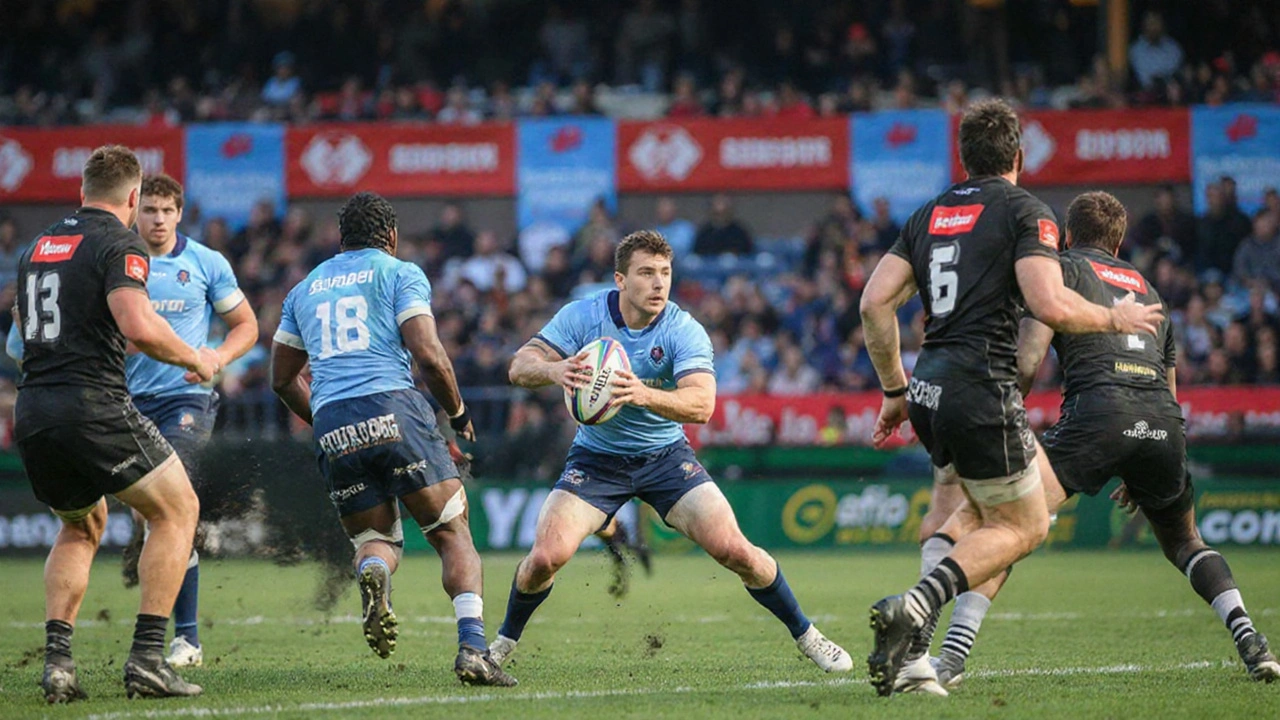 Sep, 27 2025
Sep, 27 2025
On 19 April 2025 the Bulls made history by becoming the first South African side to win at Thomond Park, edging Munster 16‑13 in a closely fought Round 15 clash. Yet the result was clouded by a glaring officiating blunder that temporarily left Munster playing with only 14 men, a situation that sparked an immediate outcry from fans, players and pundits alike. This mishap, together with a disputed quick‑tap that led to the Bulls’ only try, prompted the United Rugby Championship (URC) to issue a comprehensive statement.
What went wrong on the field?
Munster’s front‑row woes began early when both tight‑head props suffered injuries in the first and second halves. Under Law 3.13, a team lacking a specialist prop must shift to uncontested scrums from the 52nd minute. The protocol relies on a sideline management app to flag whether a substitution reduces a side’s player count.
During the final quarter the app malfunctioned, feeding incorrect data to the technical zone officials. After consulting them, referee Andrea Piardi applied Law 3.20 in error and instructed hooker Alex Kendellen to leave the field, mistakenly treating the situation as a forced reduction rather than an uncontested scrum scenario. Munster Bulls officiating error was only rectified after several minutes of play, by which point Munster had been forced to defend with a numerical disadvantage during a crucial pressure spell.
A second officiating slip involved Bulls No 8 Cameron Hanekom, who executed an illegal quick‑tap by using his knee instead of his foot. The law dictates a scrum should have been awarded to Munster, but the referee allowed play to continue, leading directly to the match‑winning try.

Aftermath and steps taken by the URC
The URC’s investigation traced the problem to two root causes: a technical failure of the sideline app and a misinterpretation of the relevant laws by the technical officials. In response, the governing body introduced a suite of corrective actions designed to tighten the substitution and scrum‑management process.
- Referees now assume full responsibility for every substitution decision and must verify player counts personally before signalling.
- Technical zone protocols and uncontested‑scrum documentation have been redistributed to all match officials and club staff.
- The sideline management system will undergo a full upgrade, with redundancy checks to prevent future data glitches.
- Mandatory refresher workshops on Law 3.13, 3.20 and quick‑tap procedures are being rolled out for technical officials and club personnel.
- Ongoing monitoring and feedback loops have been established to evaluate officiating consistency throughout the season.
The URC also shut down rumors that Piardi had been removed from the Round 16 schedule, confirming he was never slated to officiate any matches that week. The clarification came after speculation linked the error to potential disciplinary action, especially given Piardi’s recent consideration for Lions Test duties.
Beyond the immediate fallout, the loss deepens Munster’s scramble for a top‑four finish with only three regular‑season rounds remaining. A lower seeding could force the province into a tougher pool for the next season’s Investec Champions Cup, extending the repercussions of the officiating mishap well beyond this single game.
Notably, this isn’t the first time Munster have been penalised for an officiating oversight this season. A similar 14‑man incident occurred in October against Leinster at Croke Park, raising broader questions about the URC’s consistency in applying scrum laws. The cumulative effect of these errors has put pressure on the league to demonstrate that its corrective measures are more than just paperwork.

Satpal Singh
September 27, 2025 AT 04:00It appears the sideline management app suffered a critical glitch during the closing stages, feeding erroneous data to the officials. The protocol requires a manual verification step, which was unfortunately omitted in this case. Consequently, the referee applied Law 3.20 under the false impression that Munster had lost a player. This misinterpretation forced Alex Kendellen off the field, creating a temporary 14‑man situation. The URC’s subsequent acknowledgment is a necessary first step toward restoring confidence in the officiating process.
Devendra Pandey
September 27, 2025 AT 21:30One might argue that the focus on technology distracts from the human element inherent in rugby officiating. While the app malfunction is undeniable, the referee’s discretionary authority remains paramount. Blaming the system entirely ignores the duty of officials to double‑check player counts. Moreover, the quick‑tap incident highlights a broader inconsistency in rule enforcement. Ultimately, these errors reflect deeper systemic issues rather than isolated technical failures.
manoj jadhav
September 28, 2025 AT 15:00The Munster‑Bulls encounter serves as a case study in how layered procedural safeguards can simultaneously protect and imperil a match; when each layer fails, the cumulative effect can be catastrophic. The initial injury to both tight‑head props activated Law 3.13, obligating the teams to shift to uncontested scrums after the 52‑minute mark, a nuance that many casual observers overlook. The sideline app, designed to flag such scenarios, malfunctioned precisely when its input was most critical, feeding the technical officials a false substitution count. The referee, observing the erroneous data, invoked Law 3.20, a provision intended for genuine forced reductions, and instructed hooker Alex Kendellen to leave the field, thereby creating an artificial 14‑man deficit. This decision persisted for several minutes, during which Munster’s defensive structure was stretched to its limits, exposing them to heightened pressure and, ultimately, a pivotal scoring opportunity for the Bulls. Simultaneously, the quick‑tap controversy introduced another variable; Cameron Hanekom’s use of his knee contravened the prescribed foot‑tap rule, yet the referee permitted play to continue, awarding a try that directly altered the scoreboard. The juxtaposition of these two errors illustrates a systemic breakdown in both technology and human judgment, suggesting that reliance on a single point of failure is untenable. In response, the URC’s corrective measures-mandatory referee verification of player counts, upgraded redundancy checks on the app, and refreshed law workshops-represent a multi‑pronged approach aimed at reinforcing each procedural layer. However, the efficacy of these interventions will depend on consistent implementation across all match officials, not merely on paper directives. Moreover, the league’s denial of rumors surrounding Andrea Piardi’s removal underscores the importance of clear communication to prevent misinformation from eroding stakeholder trust. The broader implications for Munster’s standing in the competition are non‑trivial; a loss of three points can jeopardize a top‑four finish, potentially relegating the province to a more challenging Champions Cup pool. Historically, Munster has endured similar officiating controversies, as evidenced by the October incident versus Leinster, indicating a pattern rather than an anomaly. This pattern calls into question the URC’s oversight mechanisms and their capacity to adapt to recurring challenges. While the newly instituted monitoring loops and feedback systems are promising, their success will hinge on transparent data collection and timely corrective action. Ultimately, the convergence of technical glitches, procedural misinterpretations, and inconsistent law enforcement threatens the integrity of the competition, and only a sustained commitment to rigorous standards can restore confidence among players, fans, and administrators alike.
saurav kumar
September 29, 2025 AT 08:31The app glitch really cost Munster.
Ashish Kumar
September 30, 2025 AT 02:01The sanctity of the game is compromised when technology falters and officials err, and this match starkly illustrates that truth. It is not merely a mistake but a betrayal of the players who trust in fair play. The URC’s delayed acknowledgment, though welcome, cannot undo the disadvantage imposed on Munster in those crucial minutes. Such incidents demand accountability beyond a perfunctory statement; they require tangible reforms that prioritize the sport’s integrity. Let this serve as a reminder that the pursuit of perfection must begin with humility and vigilance.
Pinki Bhatia
September 30, 2025 AT 19:32I can understand the frustration of Munster supporters seeing their team forced to play a man down. The technical failure was clearly a factor, and the quick‑tap oversight added insult to injury. It’s good that the URC is taking steps, but I hope they implement them swiftly so future matches aren’t marred by similar issues. Fans and players alike deserve a fair and transparent officiating process.
NARESH KUMAR
October 1, 2025 AT 13:02Hey folks, let’s look at this as a learning moment for everyone involved 😊. The technology hiccup shows we need better checks, and the officiating slip reminds us that human judgment is never infallible. The URC’s new guidelines should help, but it’ll take collective effort from referees, teams, and officials to make a real difference. Keep the conversation constructive and supportive! 🙌
Purna Chandra
October 2, 2025 AT 06:32Honestly, this whole saga reads like a badly scripted drama, complete with the tragic hero (Munster) victimized by a clumsy tech‑goblin and a clueless referee. If the league wanted a spectacle, they got one, but at the expense of sporting credibility. Let’s hope the next episode features fewer bloopers and more professionalism.
Mohamed Rafi Mohamed Ansari
October 3, 2025 AT 00:03The incident underscores the importance of redundant verification mechanisms in match officiating. A simple manual cross‑check by the referee could have caught the app’s erroneous player count before the mistake escalated. Implementing a double‑entry system for player substitutions may mitigate similar risks. Additionally, regular training on Law 3.13 and 3.20 will ensure officials apply the correct protocols under pressure. These measures, combined with the planned system upgrades, should enhance overall match integrity.
अभिषेख भदौरिया
October 3, 2025 AT 17:33In the grand tapestry of sport, occasional missteps remind us of our shared humanity and the perpetual quest for improvement. While the recent errors were regrettable, they also provide an opportunity for the URC to refine its processes and emerge stronger. Let us remain hopeful that the forthcoming reforms will safeguard the spirit of competition.
Nathan Ryu
October 4, 2025 AT 11:03It is patently obvious that the league has been languishing in complacency for far too long. The repeated officiating blunders are not isolated incidents but symptoms of a deeper institutional malaise. If the URC truly cares about the integrity of the championship, it must overhaul its training protocols and enforce strict accountability. Anything less is a disservice to the fans, the players, and the sport itself.
Atul Zalavadiya
October 5, 2025 AT 04:34The quick‑tap violation is a textbook example of rule misinterpretation that should have been caught instantly. According to the law, any use of a limb other than the foot invalidates the tap, granting a scrum to the opposition. The referee’s decision to allow play to continue directly facilitated the decisive try. This oversight, coupled with the app malfunction, compounds the injustice suffered by Munster.
Amol Rane
October 5, 2025 AT 22:04One could contemplate the metaphysical implications of a game turned on its head by a digital malfunction, yet such rumination does little to remedy the on‑field consequences. The reality remains: a critical error altered the match outcome, demanding concrete corrective action rather than abstract musings.
Venkatesh nayak
October 6, 2025 AT 15:34The URC’s response, though extensive, must translate into measurable improvements on the field 😊. Continuous monitoring and feedback loops are promising, provided they are executed with transparency and rigor.
rao saddam
October 7, 2025 AT 09:05Let's channel this frustration into positive change!!! Officials must double‑check every substitution; technology should serve as a safety net, not a trap!!! The league's new workshops are a step forward, but implementation is key!!!
Prince Fajardo
October 8, 2025 AT 02:35Oh, the grand narrative of human error versus technological salvation-how utterly melodramatic! One can almost hear the tragic orchestra swell as the referee fumbles his duties.
Subhashree Das
October 8, 2025 AT 20:06While the theatrics are amusing, the facts remain: a flawed system and poor officiating directly impacted the result, and sensationalism does nothing to fix that.
jitendra vishwakarma
October 9, 2025 AT 13:36yeah, seems like a big oops, hope they fix it quick.